Verdi: Aida (Ono)
Introduction
A 2004 performance from Brussels of Verdi`s operatic foray into the politics of ancient Egypt, conducted by Kazushi Ono.
The story is as follows...
Egypt and Ethiopia are at war, and Aida, the daughter of the Ethiopian king has been captured and is now a slave, but no-one knows her real identity. Radames, a captain in the Egyptian army, is in love with Aida, but Amneris, the daughter of the Pharoah, is in love with Radames herself, and is not at all happy about where his affections lie.
Radames has been appointed commander of the Egyptian forces, and is sent off to repel an Ethiopian attack. He is successful and returns with a large number of prisoners, one of whom is Aida`s father Amonasro, who claims to be a common soldier. He recognises his daughter and Aida accidentally reveals that he is her father, but not that he is the king.
Radames asks that all the prisoners are spared, which gives Amonasro the chance to see his daughter and persuades her to find out the route the Egyptian army will take for the next battle. She manages to do this, but Amonasro has now announced who he really is, and escapes to prepare his own troops.
Radames is distraught that he has inadvertently betrayed his country and hands himself over to the high priests for trial. He is found guilty, despite protestations from Amneris, and sentenced to be buried alive. After the final stone has been rolled into place, Aida appears. She hid herself in the tomb when the sentence was announced and so Radames and her can now be together, far from human eyes, and for the short time they have left.
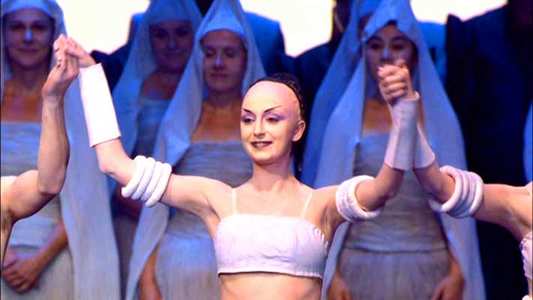
Video
Region-free NTSC 16:9 anamorphic transfer, and filmed in High Definition, but I still cannot comment on the effectiveness of this, not having a HD TV. The general picture quality is very good though, and colours are nice and vibrant when we get them - much of the production is set and lit in dark blues or light white, so when a dash of red or green appears, it`s quite striking.
I did wonder whether there was any problem with some of the lighting quality of the disc, but after a couple of viewings it looks as if it was some dodgy spot-work from the team in the theatre - which is not going to be fairly obvious on HD recordings.

Audio
The DTS option presents a very powerful and immediate sound (and for an opera with plenty of bass drum action this is always a good thing). The clarity though is also a slight drawback, as not only does every cough from what appeared to be a very sick audience get heard, Kazushi Ono gets a little carried away with his conducting and adds a few sound effects of his own. These can even be heard over the music at the end of Act II!
Having said that, there appears to be little problem with balance between pit and stage, with both Aida and Amneris soaring over the top of the orchestra where necessary.
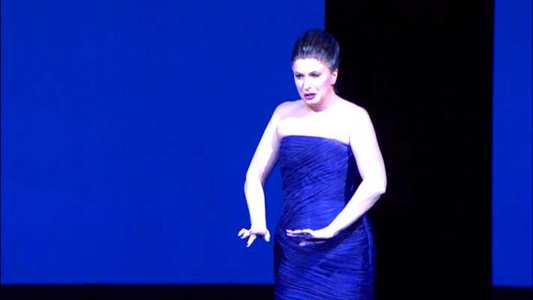
Features
Extras are disappointingly limited to the cast gallery and illustrated audio synopsis. I sometimes wish that we could have some form of mini-documentary about the theatre in which the performance takes place, as from the brief glimpses we have at the curtina calls, it looks like a fantastic place. At the very least, some form of explanation as to the whys and wherefores of a such a `highly stylised` production should be compulsory.
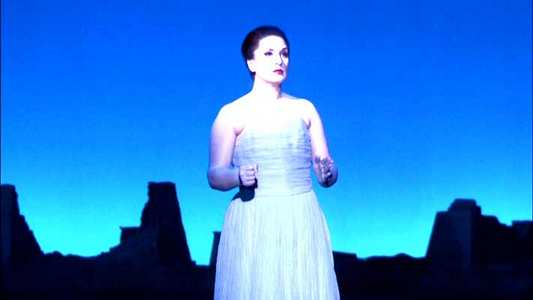
Conclusion
If you were to ask for a list of favourite `grand operas`, then Aida is always going to be on top, not only for the incredible inventiveness and beauty of Verdi`s music, but for the scenes of great Egyptian ceremony, attempts at recreating the pyramids, huge choruses, and possibly elephants and camels if you`re lucky.
Here however, we have what is described as `Cult director Robert Wilson`s highly stylised and intensely dramatic staging`, which means everything is pared down, from the minimalist scenery, to the movements - if that is the right word, as noone actually moves very much at all. Basically, he has done to Aida what he did to Madame Butterfly (also reviewed here) but what was moderately successful for the Japanese setting, is practically a non-starter in this production. This opera is meant to be produced as lavishly as possible. The story demands it, the music demands it, and I suspect the audience was demanding it judging by the lack of applause at many expectant pauses.
I was particularly annoyed by the ballet segments. The Priestesses dance should be highly sensual, danced by beautiful young maidens, but I spotted a couple of blokes in there as well, and the costumes looked like cheap cardboard outfits. Together with movements that didn`t fit the music at all, it was a bit of a let down. The same went for the `Dance of the little Moorish slaves` - one chap, completely un-Moorish, wearing some bright red feathered shorts and with bright red hair. As for the main ballet sequence within the Triumphal March, the less said the better.
But…all is not lost. Musically, I was very impressed by much of what I heard.
The pace of the drama was kept nice and tight by the grunting Maestro Ono, and the orchestral sound was generally very fine indeed, especially from the woodwind princpals. The violins almost managed the opening of Act III without sounding dreadful, but it`s a notoroiusly difficult passage and is thankfully played as quietly as possible.
I wasn`t at all happy by Marco Berti`s Radames. He was the only one on the stage who seemed to be affected by the direction, not showing any emotion, or indeed much at all, in his face. Sounding like the stereotypical Italian tenor, much of his notes were slid up to and not always hit, making `Celeste Aida` rather painful, and almost destroying the final heart-wrenching scene in the tomb. You would be forgiven for wishing that Radames hurried up amd died so we could could just have Aida singing at the end.
The honours for best singing go jointly to Norma Fantini (Aida) and Amneris (Ildiko Komlosi). Despite the restrictions of the direction, they both managed to produce highly moving performances. Fantini`s voice is ravishing in the final scene (and indeed throughout) and Komlosi creates a hugely spiteful and nasty character, only to turn her around completely towards the end and make us feel as if we were the ones who had misjudged her completely.
Another fine performance comes from the powerful American bass, Mark Doss (Amonasro). He also seemed to subtly break free of the `stand and deliver` directions and created a huge amount of emotion in his face and voice, as he wasn`t allowed to show it in other ways.
So, a shame that the production leaves a lot to be desired, as the music is geernally well worth listening to, if only for the wonderful singing of the two lead females.
It`s also a shame about the lack of elephants.
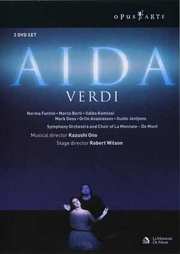
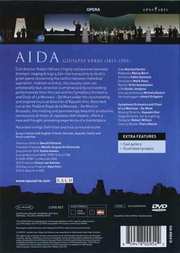





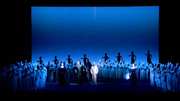

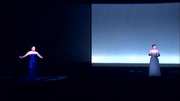
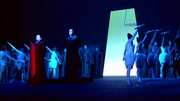


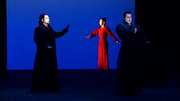






























Your Opinions and Comments
Be the first to post a comment!